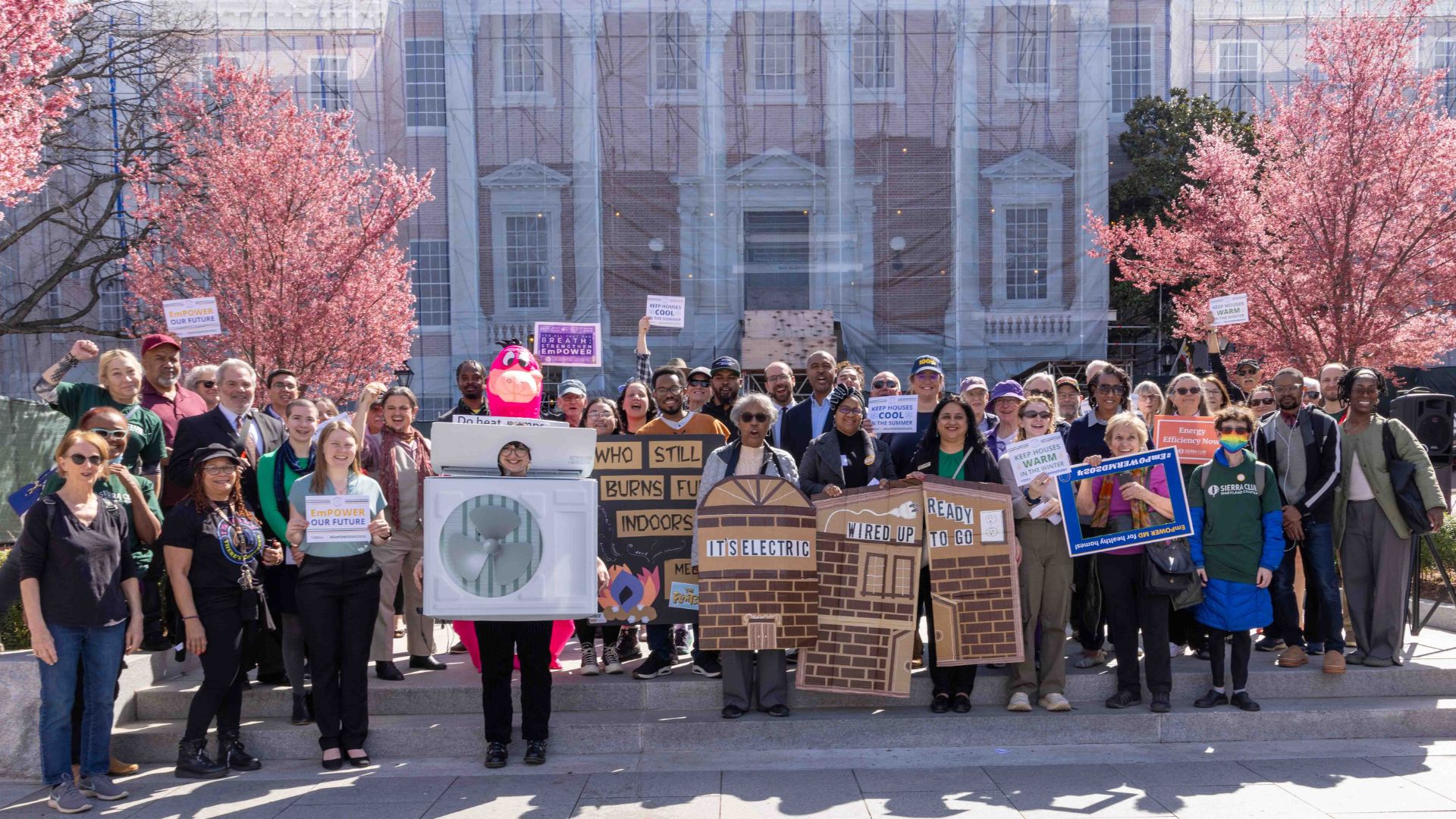
Wins, losses, and ‘almost did its’ for 2020
The Maryland General Assembly wrapped up the 2020 legislative session last week, weeks earlier than expected. While the public health crisis meant some of our legislative priorities didn’t make it through this year, we still have a lot to celebrate.
The past couple of weeks have brought some pretty intense changes to all of our lives. Our team at Maryland PIRG and our national network, U.S.PIRG, have quickly pivoted some of our work to ensure that we are responding to the significant public health threat before us, and the corresponding challenges to consumers and our democracy.
But, we’re also committed to continuing our work at the state and local level to protect public health, foster a stronger democracy, reduce waste, and more.
The Maryland General Assembly wrapped up the 2020 legislative session last week, weeks earlier than expected. While the public health crisis meant some of our legislative priorities didn’t make it through this year, we still have a lot to celebrate.
As a small donor funded, grassroots organization, we’re up against tough odds, but by combining citizen action and tough minded advocacy we continue to make progress on our most pressing issues.
Here’s a roundup of the legislative session: the wins, the losses, and the “almost did its.”
We did it!
Family and Fire Fighter Protection Act (SB447/HB424)
Senator Guzzone and Delegate Cullison
The Family and Firefighter Protection Act passed with strong bipartisan support. It was championed by Maryland firefighters and public health advocates, including the Professional Fire Fighters of Maryland, the Maryland Fireman’s Association, Maryland PIRG and the Natural Resources Defense Council. This bill restricts the use of flame retardant chemicals in furniture, mattresses and children’s products. These chemicals are not effective for fire safety. Commonly used chemical flame retardants are linked to cancer and other health impacts.
Increase and Expand the Tobacco Tax (SB3/HB732)
Senator McCray and Delegate Luedtke
We need to protect kids from nicotine addiction and all the harm that comes with it. This bill increases the tobacco tax and expands it to include all tobacco products including electronic cigarettes.
Textbooks Price Transparency Act (SB667/HB318)
Senator Rosapepe and Delegate Stewart
Students in the midst of financial planning for college need access to the full cost and range of choices, including those related to cost of course materials. This bill provides students in the University of Maryland system with vital information about their textbook options by including information about which classes offer free or low cost textbooks in the course catalogue. Providing students this information while they are registering for classes allows them to make informed choices and financially plan.
Ban Chlorpyrifos (SB300/HB229)
Senator Lam and Delegate Stein
This bill bans the use of the toxic insecticide chlorpyrifos to protect workers, families, and children from toxic exposure.
Hospital Fee transparency (SB632/HB915)
Senator Kelley and Delegate R. Lewis)
This bill increases price transparency for “outpatient facility fees” which are separate from fees for professional service. This added transparency is essential to protect patients as consumers and to help address the increasing costs of healthcare in Maryland.
The very least we can do about rising health care costs is make sure consumers can get prices for fees, services and treatment up front, to allow for more informed decisions about value, encourage price competition that could help keep costs in check, and create accountability for unreasonably high-cost hospitals and providers.
Almost did it!
(These bills moved out of committee, or passed one chamber but didn’t get a vote in the second)
Safe School Drinking Water Act
Sen. McCray and Del. Solomon (SB992/HB1475)
Sen. Carter and Del. Rosenberg (SB371/HB457)
Lead is a potent neurotoxin that affects how our children develop, learn, and behave. Across Maryland, testing is revealing lead in the drinking water in our schools. This policy strengthens protections for lead in school drinking water by lowering the action level to 5ppb. In 2019 it passsed the House but not the Senate. In 2020 it passed the Senate, but not the House! Next year, we’ll get it through both.
Maryland Fair Elections Act (SB613/HB1125)
Senator Pinsky and Delegate Feldmark
This bill creates a small donor campaign finance program for statewide offices that enables candidates for Governor, Comptroller, and Attorney General to run for office without large or corporate campaign contributions by providing limited matching funds for small donations. A version of the bill which only applied for the Governor’s raced passed through two Senate committees but didn’t get a vote in the House.
Creating a new way to fund races for Governor is incredibly important. As our recent report shows, the people and entities that donate to Maryland’s Gubernatorial campaigns are not reflective of Marylanders who are eligible to vote in these elections. The report finds that the money raised comes primarily from out of state or non individuals who contribute disproportionately large sums of money.
Student Voter Empowerment Act (SB647/HB245)
Senator Lam and Delegate Luedtke
Gives Universities and Colleges the necessary tools to increase civic engagement and participation in democracy among young voters. Requires large Universities to have a polling location on campus.
A version of this bill passed out of the House but did not get a vote on the Senate floor. The bill that passed would have required Maryland Universities to have a plan for student voting and a student voting coordinator to help students and student groups navigate voter registration and voting.
Plastic Packaging Reduction Act (SB313/HB209)
Senator Augustine and Delegate Lierman
Nothing we use for a few minutes should threaten our health and pollute our environment for hundreds of years. The waste we produce means more leaky landfills, dirty air from incinerators, and more litter and litter cleanup costs.
This bill bans single-use plastic bags and creates a task force to create a plan to deal with plastic waste. The House passed a version of the bill that would have banned single-use plastic bags, but it didn’t receive a vote on the Senate floor.
Community Choice Energy (SB315/HB561)
Senator Beidle and Delegate Charkoudian
This bill enables municipalities to set up alternatives to the investor-owned energy supply system. Community choice energy (CCE) allows residents in a community to control the type of electricity purchased by their local utility. CCE’s can enable communities to negotiate lower rates and use more renewable energy.
A version of this bill passed out of the House which would have enabled Montgomery County to pilot CCE for 7 years. The amended bill did not receive a vote in the Senate.
Losses
Protect our Kids from Nicotine Addiction (SB233/HB3)
Office of the Attorney General and Delegate D.E. Davis
We need to protect kids from nicotine addiction and all the harm that comes with it. This bill would have stoppted the sale of all flavored tobacco products, including e-cigarettes, menthol cigarettes, and cigars.
Right to Repair (SB723/HB1124)
Senator Fry Hester and Delegate Feldmark
Delegate Hornberger – Right to Repair Farm Equipment (HB699)
We generate way too much waste, and companies intentionally make things harder to repair. This bill gives consumers and small businesses access to the parts, tools and service information they need to repair products so we can keep things in use and reduce waste.
These bills did not receive votes on either chamber’s floor.
Fair Elections for General Assembly (SB947/HB1351)
Senator Pinsky and Delegate Mosby
This bill creates a campaign finance program for State Senate and House of Delegates that enables candidates to run for office without large or corporate campaign contributions by providing limited matching funds for small donations.
This bill did not receive votes on either chamber’s floor.
###
Topics
Authors
Emily Scarr
State Director, Maryland PIRG; Director, Stop Toxic PFAS Campaign, PIRG
Emily directs strategy, organizational development, research, communications and legislative advocacy for Maryland PIRG. Emily has helped win small donor public financing in Baltimore City, Baltimore County, Howard County, Montgomery County, and Prince George's County. She has played a key role in establishing new state laws to to protect public health by restricting the use of antibiotics on Maryland farms, require testing for lead in school drinking water and restrict the use of toxic flame retardant and PFAS chemicals. Emily also serves on the Executive Committees of the Maryland Fair Elections Coalition and the Maryland Campaign to Keep Antibiotics Working. Emily lives in Baltimore City with her husband, kids, and dog.
Find Out More

2024 Maryland Legislative Session: Wins and Losses

Protecting Maryland Water from PFAS Pollution

PIRG’s warmest wishes for a safe and happy new year

